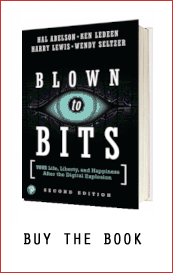Preface
For thousands of years, people have been saying that the world is changing and will never again be the same. Yet the profound changes happening today are different, because they result from a specific technological development.
It is now possible, in principle, to remember everything that anyone says, writes, sings, draws, or photographs. Everything. If digitized, the world has enough disks and memory chips to save it all, for as long as civilization can keep producing computers and disk drives. Global computer networks can make it available to everywhere in the world, almost instantly. And computers are powerful enough to extract meaning from all that information, to find patterns and make connections in the blink of an eye.
In centuries gone by, others may have dreamed these things could happen, in utopian fantasies or in nightmares. But now they are happening. We are living in the middle of the changes, and we can see the changes happening.
But we don’t know how things will turn out.
Right now, governments and the other institutions of human societies are deciding how to use the new possibilities. Each of us is participating as we make decisions for ourselves, for our families, and for people we work with. Everyone needs to know how their world and the world around them is changing as a result of this explosion of digital information. Everyone should know how the decisions will affect their lives, and the lives of their children and grandchildren and everyone who comes after.
That is why we wrote this book.
Each of us has been in the computing field for more than forty years. The book is the product of a lifetime of observing and participating in the changes it has brought. Each of us has been both a teacher and a learner in the field. This book emerged from a general education course we have taught at Harvard, but it is not a textbook. We wrote this book to share what wisdom we have with as many people as we can reach. We try to paint a big picture, with dozens of illuminating anecdotes as the brushstrokes. We aim to entertain you at the same time as we provoke your thinking.
You don’t need a computer to read this book. But we would suggest that you use one, connected to the Internet, to explore any topic that strikes your curiosity or excites your interest. Don’t be afraid to type some of the things we mention into your favorite search engine and see what comes up. We mention many web sites, and give their complete descriptors, such as bitsbook.com, which happens to be the site for this book itself. But most of the time, you should be able to find things more quickly by searching for them. There are many valuable public information sources and public interest groups where you can learn more, and can participate in the ongoing global conversation about the issues we discuss.
We offer some strong opinions in this book. If you would like to react to what we say, please visit the book’s web site for an ongoing discussion.
Our picture of the changes brought by the digital explosion is drawn largely with reference to the United States and its laws and culture, but the issues we raise are critical for citizens of all free societies, and for all people who hope their societies will become freer.

